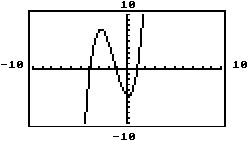Simplify.
A. 
B. 
C. 
D. 
Answer: B
You might also like to view...
Find all rational zeros of the polynomial.
?

What will be an ideal response?
Graph the function.


A. 
B. 
C. 
D. 
Find the equation that the given graph represents and give the domain, range, and interval(s) over which the function is increasing and decreasing.
A. P(x) = -x3 + 4x2 + x - 5; domain: (-?, ?); range: (-?, ?); Increasing over (-?, .16); Decreasing over [-2.86, ?) B. P(x) = x5 + 4x3 - x2 + 3x - 5; domain: (-?, ?); range: (-?, ?); Increasing over (-?, 2.86] ; Decreasing over [2.86, .16] and [.16, ?) C. P(x) = x3 + x2 + x + 5; domain: (-?, ?); range: (-?, ?); Increasing over (-?, -4.12] and [1.45, ?); Decreasing over [-4.12, 1.45] D. P(x) = x3 + 4x2 - x - 5; domain: (-?, ?); range: (-?, ?); Increasing over (-?, -2.86] and [.16, ?); Decreasing over [-2.86, .16]
Solve the quadratic equation using the quadratic formula.2x2 + 6x + 3 = 0
A. 
B. 
C. 
D. 